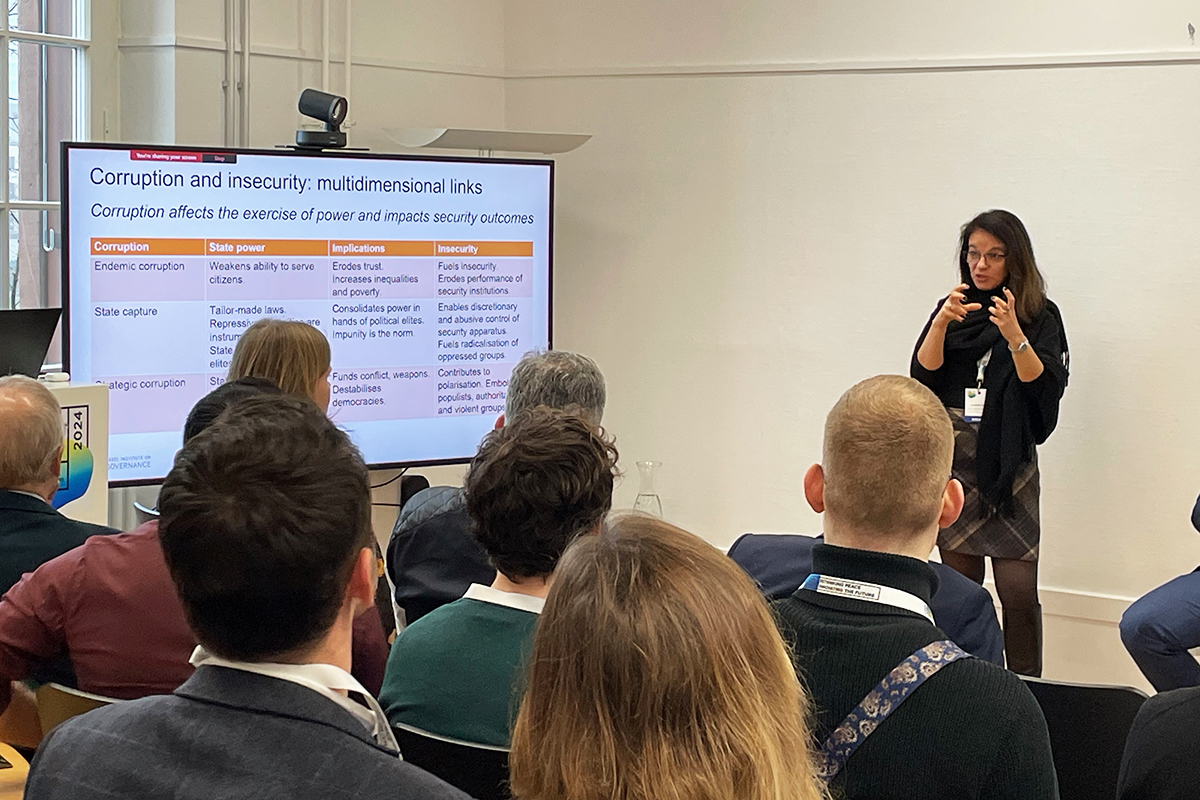How (strategic) corruption fuels insecurity by affecting power

How do corruption and security intersect? What is strategic corruption and what can we do about it?
These were two fundamental questions tackled at the Countering Strategic Corruption workshop at the 2024 Basel Peace Forum. Claudia Baez Camargo, Head of Prevention, Research and Innovation at the Basel Institute on Governance, spoke at the event. Together with her colleague Saba Kassa, the team’s Deputy Head, she highlights two key ideas:
- Using the lens of power helps us to better understand how corruption impacts security. Corruption changes power dynamics, which in turn affect security.
- We need to see how corruption is a highly functional tool for those seeking not just private benefits but – in the case of strategic corruption – geopolitical goals.
Power: at the heart of corruption and security issues
Corruption fuels insecurity in many ways, directly and indirectly. But the big picture is that corruption affects the exercise of power by undermining it, or by strengthening it in a particular person or group’s favour.
Changes in power in turn affect all forms of human security, including a country’s ability to defend itself against internal or external threats.
It is useful to think of three different types of corruption:
| Corruption | State power | Implications | Insecurity |
|---|---|---|---|
| Endemic corruption | Weakens ability to serve citizens. |
Erodes trust. Increases inequalities and poverty. |
Fuels insecurity. Erodes performance of security institutions. |
| State capture |
Repressive capacities are instrumentalised. State institutions serve elites. |
Consolidates power in hands of political elites. Impunity is the norm. |
Enables discretionary and abusive control of security apparatus. Fuels radicalisation of oppressed groups. |
| Strategic corruption | State powers abused and weaponised to achieve a geopolitical goal. |
Funds conflict, weapons. Influences or destabilises other countries. |
Contributes to polarisation. Emboldens populists, authoritarian or violent groups. |
Endemic corruption: weakening institutions and trust
Widespread and systemic corruption affects the ability of the state to serve citizens. Consider the theft of public funds earmarked for hospitals or medicines, which affects citizens' access to good health care. Consequences include higher inequality and poverty, as well as an erosion of trust in government and public institutions. This is where security risks come in. Popular protests may spur violence and conflict as tensions rise.
In conflict-afflicted and fragile contexts, theft of humanitarian aid or resources dedicated to strengthening legitimate state actors and institutions can undermine the prospects for sustainable peace.
A related problem is the systematic erosion of defence and security institutions. Corrupt procurement deals and embezzlement leave institutions with underpaid and underequipped staff while draining national budgets.
This makes it very challenging to respond to domestic and external threats, and organised crime and terrorism can get a stronger foot in the door. For example, research in Nigeria has shown that corruption in the military affects the ability to respond effectively to the militant group Boko Haram. In other words, corruption undermines the most basic responsibility of states: protecting citizens from violence and conflict.
State capture: centralising power
State capture is a systemic form of corruption in which political elites, often together with economic elites, control state institutions for their narrow purposes. It is more than about siphoning off state resources with impunity. It can be about getting laws, such as procurement rules, just right for those political elites and their associates to win lucrative contracts or control valuable natural resource sectors.
The unchecked ability to shape laws and direct state intuitions puts a lot of power in the hands of a few people. For example, they can instrumentalise enforcement institutions such as the police or courts to neutralise opponents and ensure impunity for their circle. All this strengthens their power base. And it shows again that corruption can be a highly functional tool.
The citizens of a country suffering from state capture understand that power is exercised discretionarily and that the rules apply to some and not to others. Fear and powerlessness often close the door to challenging the situation through democratic means.
Strategic corruption: a powerful geopolitical tool
Strategic corruption goes beyond the kind of narrow personal benefits implied in the common definition of corruption as “the abuse of entrusted power for private gain”. Here, corruption is weaponised to help change power dynamics on the geopolitical stage.
In this cross-border and global context, states can use corrupt means and divert public resources to fund their geopolitical objectives. For an in-depth case study of strategic corruption, see the Kremlin Playbook series.
Looking at examples of strategic corruption again highlights the functionality of corruption. It’s used not only to gain money and control of resources but because it gives people the power to achieve their goals.
That functionality goes both ways. Even in democratic contexts, politicians can use accusations of corruption to erode trust in opponents or public institutions and weaken their legitimacy. On the other hand, politicians with a strong anti-corruption platform can see success in the polls, as Guatemala and Bulgaria have recently demonstrated.
What we can learn from corruption’s power and functionality
The main takeaway? Looking at power and functionality helps us better understand how corruption affects security and at why strategic corruption is increasingly becoming a concern.
The main lesson? That we need to fight (strategic) corruption by disrupting its functionality, i.e. making it less of an effective strategy for obtaining power and achieving other illicit goals. And to do that, we need to ensure that anti-corruption efforts are strategic, coordinated and effective.




